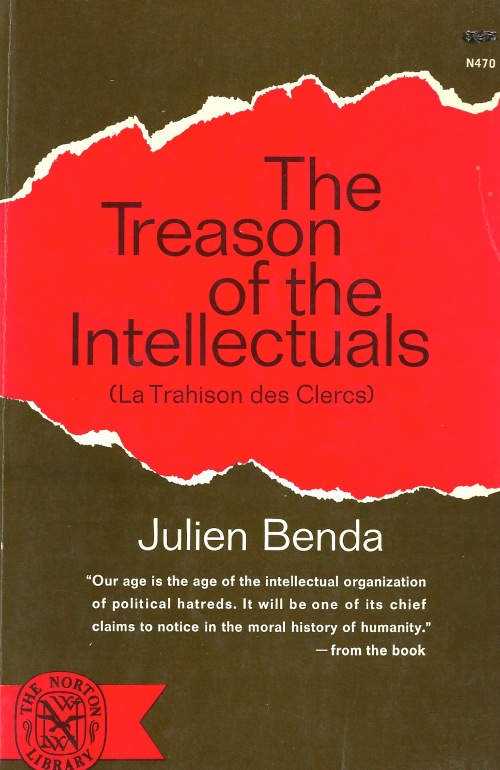Julien Benda, The Treason of the Intellectuals (La Trahison des Clercs) [1927]
Julien Benda’s Treason of the Intellectuals can be read as a gloss on the Dreyfus Affair. In this polemic against intellectuals who have betrayed their vocation, Benda affirms the contestatory position of a writer like Zola. Benda takes note of the modern perfecting of political passions, particularly those of race, class, and nation. He asserts that “[o]ur age is indeed the age of the intellectual organization of political hatreds. It will be one of its chief claims to notice in the moral history of humanity.” [27] And it is just the pursuit of such political passions that constitute what Benda deems the “real” world, of the layperson whose expected mission is to pursue practical interests. The true intellectual, on the other hand, has a two-fold mission: to pursue in his or her intellectual path disinterested activity for its own sake and to remind the laypersons that there is a transcendent set of values that ought to be respected. The true intellectual, according to Benda, would have to agree with Jesus’s avowal, “My kingdom is not of this world.” [43] The intellectuals have an utterly pure mission, in contrast to the impure and practical interests that govern the masses: “I only say that the ‘clerks’ who indulged in this fanaticism betrayed their duty, which is precisely to set up a corporation whose sole cult is that of justice and of truth, in opposition to the peoples and the injustices to which they are condemned by their religions of this earth.” [57] It is by steadfastly maintaining allegiance to that cult of justice and truth that the intellectual fulfills her role.
What Benda found scandalous was the large degree to which intellectuals betrayed this secular prophetic calling: He was appalled by the xenophobia, the chauvinism, the glorification of the particular against the universal, and the exaltation of nationalism. The intellectuals pander to material interests and forfeit their normative contribution to the nation, which is to hold it to a rigorous standard of ethics.
Admittedly, Benda’s formulation is an extremely demanding one. He himself admits the rarity of this kind of intellectual through history. Indeed, he believes that the surest sign of fidelity for the intellectual is a kind of lonely isolation: “there exists a certain criterion by which we may know whether the ‘clerk’ who takes public action does so in conformity with his true functions; and that is, that he is immediately reviled by the laymen, whose interests he thwarts (Socrates, Jesus). We may say beforehand that the ‘clerk’ who is praised by the laymen is a traitor to his office.” [51] Benda has a romantic notion of the intellectual inveighing against the corruption and barbarism of political passions. He asserts, “ the grandeur of his teaching lies precisely in this absence of practical value, and that the right morality for the prosperity of the kingdoms which are of this world, is not his, but Caesar’s. When he takes up this position, the ‘clerk’ is crucified, but he is respected, and his words haunt the memory of mankind.” [191] Hence, there is a kind of mathematical equivalence in Benda’s view of intellectuals: purity (fidelity) = persecution by the kingdoms of this world; impurity (treason or betrayal) = success and honor in the kingdoms of this world.
One cannot but think of the Salvadoran Jesuit intellectuals who, I think, fulfilled much of Benda’s normative role of the intellectuals, but with the Said/Gramscian organic intellectual proviso. Also, it is clear that Havel’s view of intellectuals when he was a dissident is clearly in line with Benda’s, similar to Chomsky’s distinction between “the commissar and the dissident,” which is a contemporary equivalent of the biblical pairing of the court prophet and the prophet honored posthumously.
—Thursday 8 August 1996

1 Comment